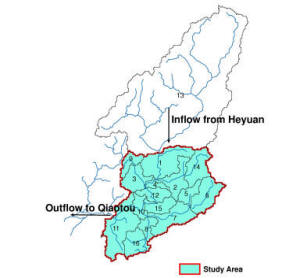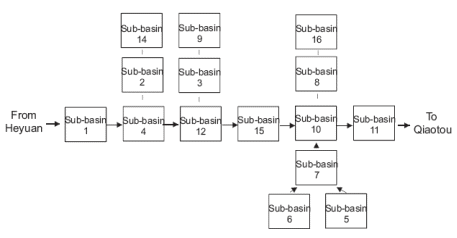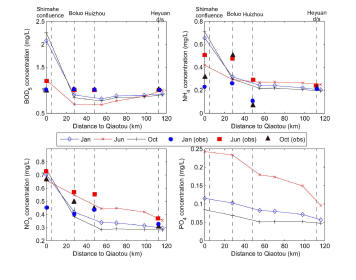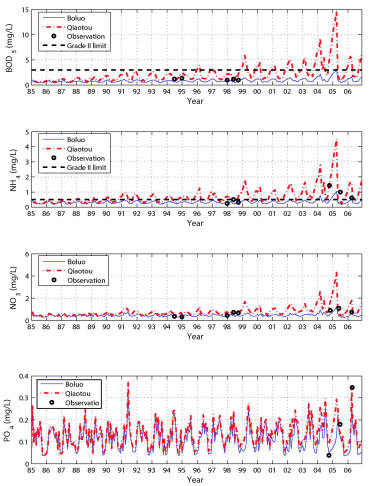Water Quality Modelling of the East River
¡@
¡@
¡@
Water Quality Modelling of the East River
Hydrological Simulation Program Fortran (HSPF)
An empirically-based lumped parameter model, HSPF (Hydrological Simulation Program Fortran, Bicknell et al., 2001), is employed to predict water quality of the East River. The emphasis is on key organic pollutant concentrations of relevance to drinking water quality (Biochemical Oxygen Demand BOD5, and ammonia nitrogen NH4. The lower East River Basin (from Heyuan to Qiaotou) is modelled. The HSPF study area (9630 km2) covers key cities including Heyuan, Huizhou, Dongguan, Shenzhen, and their associated counties.
¡@
Based on demographic and pollution data in government reports (PRWRPB, 2000; SCIES, 1999), and the use of ¡§export coefficient¡¨ approach (Fok et al., 2004), the point source (PS), non point source (NPS) and wet deposition pollution loads (kg/d) from (i) agricultural, (ii) domestic and (iii) industrial sources can be estimated.


Left: Study area of the HSPF model: from Heyuan to Qiaotou Right: Schematization of the HSPF model
Predicted by the HSPF model, normally both BOD5 and NH4 concentrations are below the Chinese National Grade II water quality threshold. However, in recent years, due to the rapid economic and population growth, and the inadequate sewage treatment in the region, a considerable increase of pollutant concentration is predicted. There is a sharp increase in pollutant concentrations when passing from Boluo to Qiaotou. This phenomenon can be attributed to the tributary Shimahe (lies in sub-basin 11), which enters the mainstream of the East River at Qiaotou.
¡@
Waste Assimilative Capacity
Waste Assimilative Capacity can be predicted accordingly. In an extremely dry year such as 2005, annual averaged concentrations of BOD5 and NH4 can reach 3.67 mg/L and 1.14 mg/L respectively, while the corresponding monthly flow is 114 m3/s. To maintain both BOD5 and NH4 concentration within the Grade 2 limit of the Chinese Government (3 mg/L and 0.5 mg/L respectively), the minimum streamflow required at Qiaotou is 267 m3/s.
¡@
|
Change in water quality along the mainstream of the East River, 1998 |
Predicted time-series of water quality (1985-2007) |

